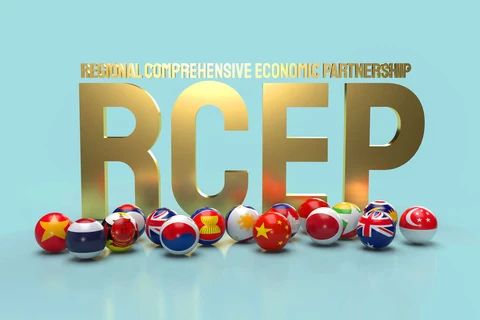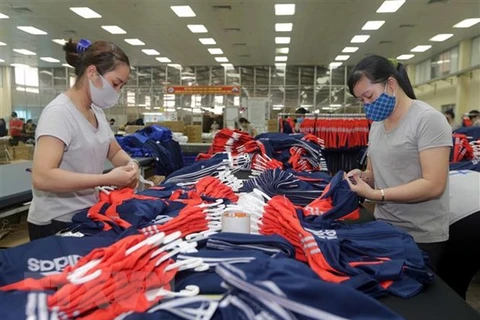Hanoi (VNA) - The Regional Comprehensive Economic Partnership (RCEP), the world’s largest trade pact, officially came into effect on January 1.
With a large market scale that makes up around 30 percent of the world population, Vietnam – one among the first six ASEAN nations ratifying the deal – expects that it will help create a stable and long-term export market contributing to promoting the implementation of policies on building an export-oriented manufacturing industry.
Around 92 percent of tariffs eliminated
Signed in November 2020, RCEP brings together the 10 ASEAN member states, along with China, Japan, the Republic of Korea, Australia and New Zealand, covering 30 percent of global gross domestic product (GDP) worth over 27 trillion USD.
RCEP will form a market with 2.2 billion consumers, and become the largest free trade area in the world in terms of population. It will eventually eliminate tariffs on as much as 92 percent of the goods traded among its signatories, expand market access for investment, harmonise rules and regulations, and strengthen the supply chains within the massive free trade zone. At least 64 percent of the tariff lines are expected to be lifted right after the agreement takes effect.
RCEP is designed to cut costs and time for businesses to export goods to any of the signatories to the agreement without having to meet separate requirements of each country.
Nguyen Thi Quynh Nga, Deputy Director of the Multilateral Trade Policy Department of the Ministry of Industry and Trade, said that thanks to the harmonisation of rules of origin in RCEP, Vietnam's exports can better meet conditions to enjoy tariff incentives because input materials are mainly sourced from RCEP markets.
This means that Vietnamese enterprises can use input materials from all the RCEP signatories, including the 10 ASEAN countries and the five partner countries, to produce goods and enjoy preferential tariffs while exporting them to any of the 14 countries, if the rules of origin are met, Nga said.
 The harmonisation of rules of origin creates favourable conditions for supply chain circulation in the region (Photo: VNA)
The harmonisation of rules of origin creates favourable conditions for supply chain circulation in the region (Photo: VNA) In addition, commitments to cutting down tariffs between China, Japan, New Zealand, Australia and the ASEAN countries to zero right after the trade pact came into effect, as well as the Republic of Korea after 10-15 years, for almost all aquatic products of Vietnam will open up new opportunities for Vietnamese firms to gain a firm foothold in RCEP markets quickly and conveniently.
Le Hang, Deputy Director of the VASEP.PRO Centre under the Vietnam Association of Seafood Exporters and Producers (VASEP), said that besides the ASEAN members, the five RCEP partners all are important markets of Vietnam’s fishery sector.
According to statistics, the export to RCEP markets currently accounts for 52 percent of the total export turnover of Vietnam’s aquatic products.
Making the most of all opportunities
RCEP is expected to create pressure to improve the quality of human resources, especially high-quality human resources with commitments and favourable conditions for human movement.
Labour productivity, as well as the quality and skills of the workforce of Vietnam and other ASEAN countries, will also be improved when the agreement came into effect.
However, Nguyen Thi Thu Trang, Director of the Vietnam Chamber of Commerce and Industry’s Centre for WTO and Integration, said that the agreement will increase competitiveness for Vietnamese goods as many RCEP partners have a commodity structure similar to that of Vietnam, but their competitiveness and value-added content are higher than the current capacity of Vietnam.
Trang advised Vietnamese enterprises to invest more to strengthen their competitiveness and bring into full play opportunities brought about by the trade deal.
Domestic firms were also recommended to improve themselves and pay more attention to technology application and business governance capacity to increase productivity and product quality./.
























